|

Junior Todd Bowers displays his GW spirit while
serving in Iraq.
By Jamie L. Freedman
Night after night, powerful images of the war
in Iraq flash across television screens worldwide.
Evening news headlines are dominated by reports
of the latest clashes between insurgents and
U.S. forces, interspersed with tales of roadside
bombs, lethal rocket attacks, and horrific scenes
of devastation and despair.
Since the launch of Operation Iraqi Freedom
in March 2003, scores of GW students and alumni
have stepped behind the headlines and into the
front line, playing a central role in Iraq’s
liberation and march toward democracy. Representing
every branch of America’s armed forces,
they complete their deployments with courage
and commitment, some even impassioned to sign
on for second tours in Iraq after returning home.
GW alumni don many hats in Iraq—infantrymen,
surgeons, JAG lawyers, Diplomatic Security Service
special agents, and the list goes on. Some have
lost their lives. Others keep the home fires
burning while their spouses serve tours of duty.
On the pages that follow, some of them candidly
share their stories with GW Magazine, painting
a moving portrait of the indelible mark that
the GW community is leaving across Iraq.
While united by pride at what they have helped
to accomplish, many told us that they are upset
by the media’s one-sided coverage of events. “There’s
so much more to the story than the daily body
count,” many expressed. “Why doesn’t
anybody report on all the good things that are
going on?” Here, we do—from rebuilding
schools and hospitals to connecting with Iraqi
peers and teaching local children how to play “Duck,
Duck, Goose,” GW students and alumni are
making a difference. We are pleased to present
their stories of bravery and hope.
Documenting Hussein’s Crimes

|
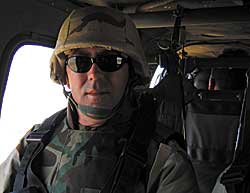
Navy Cmdr. and
GW Law School student Rex Guinn, aboard
a helicopter en route to Hatra, where
hundreds of Kurds executed by Saddam
Hussein’s regime were buried
in mass graves. Guinn oversaw the mass
grave exhumation program during his
six-month tour in Iraq.
|
Navy Cmdr. Rex Guinn, a member of the Judge
Advocate General’s Corps, is driven by a strong
desire to give something back to his country. “I
was born to a poor Oklahoma family of Native
American descent and was the first person in
my family to go to college, let alone law school,” says
the GW international LLM student. After earning
his law degree—thanks to the help of
scholarships—Guinn says that he felt
compelled to return the favor, so he joined
the JAG Corps 15 years ago. “My wife,
a Navy physician, and I both love serving in
the military, so we have stuck around all these
years,” he says. Now the parents of two
young sons, ages 6 and 3, they are based in
Norfolk, Va., where Guinn serves as the executive
officer of Trial Service Office East.
Last year, Guinn stepped forward to serve a
six-month tour in Iraq with the Regime Crimes
Liaison Office. The office was set up after
the war to provide support to the Iraqi Special
Tribunal, an independent body responsible for
trying members of Saddam Hussein’s deposed regime for crimes against
humanity. “I was fortunate to be chosen
to go,” he says.
Guinn, who was in Iraq from September 2004
through April 2005, took over the reins of the
mass grave exhumation program, completing the
much-publicized investigation at Hatra, 200 miles
north of Baghdad, and setting up future digs
at other mass grave sites around the country
to gather evidence against Hussein. At Hatra,
investigators unearthed hundreds of bodies believed
to be Kurds executed by Hussein’s
regime in the late 1980s. One trench contained
only women and children, all of whom were shot
in the head, and the other contained men with
their hands tied behind their backs. “Some
of the women were still clutching their children,
and at least one was pregnant,” Guinn says.
A particularly memorable experience for Guinn
was visiting Sedar Village, the tiny, remote
Kurdistan town that had been home to the people
buried in the mass graves at Hatra. “It’s
a two-day truck ride from Hatra, over rough terrain,
which shows you the great lengths that Saddam
went to to wipe people out,” he states.
While almost everybody in Iraq has stories
of “near
misses,” Guinn’s closest call came
at the U.S. Embassy in Baghdad, which he left
just two minutes before the rocket attack of
Jan. 25, 2005. “I was flung to the ground
but suffered no injuries,” he says.
He speaks passionately about the professionalism
and bravery of the people he worked with, Americans
and Iraqis alike. “Our military over there
is a true group of professionals who want to
get things right and pull the country back to
its feet so that it can start flowing toward
democracy,” he says.
Guinn was particularly impressed by the group
of Iraqi translators who worked in his Baghdad
office. “Their peers were disappearing
on a regular basis, but they showed up every
day to do a hard, dangerous job because they
wanted to make their country better,” he
says, adding, “It was a real highlight
for me to see the great pride that they felt
when their country held its first free elections
in over half a century.” He also spoke
highly of the judges of the Iraqi Special Tribunal,
noting that several times he was invited to visit
the home of Judge Raed Juhi, chief investigative
judge of the tribunal, who recently announced
the first charges against Hussein. “What
a gentleman and a brave man he is,” says
Guinn. “He grew up under Saddam’s
tyranny and is now the judge that will send him
to justice.”
As for himself, Guinn says that he’s not
brave; he’s just doing his job. “It’s
what I was trained to do,” he says. “It
was a real honor to be a part of documenting
Hussein’s atrocious crimes against humanity
as we help prepare to bring him to justice. I
can’t imagine doing anything more important
than that in my career.”
‘I Knew What I Had to Do’
Once was not enough for Sgt. Todd Bowers. During
the first wave of Operation Iraqi Freedom, the
GW junior spent nine months in southern Iraq
as a Marine civil affairs specialist, departing
to hugs and thanks from appreciative Iraqis thrilled
to be freed of Saddam Hussein. Returning home
in September 2003, he was disheartened by daily
reports of worsening conditions in Iraq. Midway
through his spring 2004 semester at GW’s
Elliott School of International Affairs, he saw
on the news that four American contractors had
been killed and hung from a bridge in Fallujah. “I
knew what I had to do,” he says. “I
wouldn’t be able to get a good night’s
sleep again until I returned to Iraq and tried
to patch things up.” Signing on for a second
tour, Bowers spent August 2004 to March 2005
in Fallujah—one of the country’s
worst hotspots. The going was tough, but he says
that he never regretted his decision to go back.
“During my first tour, we were greeted
by people cheering and throwing flowers at us
in the streets,” he states. “We worked
to rebuild schools, the sewage system, the infrastructure,
and the buildings, and we spent a lot of time
talking to the Iraqi civilians, explaining everything
that we were doing and helping to get them whatever
they needed. I left feeling fulfilled and gratified,
like we’d accomplished so much and really done some good. How could their
opinions of Americans change so dramatically and quickly?”
Bowers’ second tour turned out to be
equally rewarding but much more violent than
the first. He spent the bulk of his time in Fallujah,
where his civilian affairs team was attached
to a Marine infantry battalion battling insurgents. “It
was our job to reduce civilian interference during military operations,” he
says. Serving as liaisons between civilians and the military, Bowers and
his team befriended and helped the Iraqis, providing them with medical
assistance and humanitarian aid, evacuating civilians from dangerous areas,
and helping recover and bury the dead. “We added a human face to
the uniform,” states
Bowers, who says that he made many wonderful Iraqi friends in the process. “I
consider some of them to be my best friends, and really miss them terribly,” he
says.
One of Bowers’ scariest moments came last October, when an enemy
bullet hit his rifle scope during a firefight on the outskirts of Fallujah—leaving
shrapnel lodged permanently in his face. “My scope, safety glasses,
and helmet saved my life,” he says, noting that the rifle-mounted
scope was given to him by his father, John Bowers, JD ’75, a former
Marine, just two days before he left for Iraq. After being hit, Bowers
refused to leave the battlefield for a medical evaluation, insisting
on staying to fight alongside his fellow Marines.
Now, as Bowers returns to Foggy Bottom to study
Middle Eastern policy, he is full of praise for
GW’s help during his leave of absence. “GW’s
been incredible in every way,” states Bowers, who received a
generous scholarship for the 2005-06 academic year upon his return.
As happy as he is to be back at GW, he says
that he would not trade his time in Iraq for
anything. “The Marines, soldiers, sailors, and airmen are
all working long hours and doing the best they can to make things better. For
every one suicide bomber in Iraq, there are 10,000 Iraqis saying thanks, and
we can’t let them down.”
MASH Revisited
Hawkeye and Radar were nowhere to be found,
but surgeon Matthew Baker, MD ’93, experienced
MASH “on a small scale” while serving
in Iraq for a year with the 240th Forward Surgical
Team. Deployed in March 2003, Baker was part
of a highly mobile surgical unit providing
immediate, resuscitative surgery close to the
front line. “Our inflatable surgical
tents were attached to the back of a modified
Humvee,” he states. “We were designed
to set up and start operating within an hour
or so after stopping our truck.”
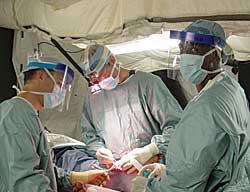
Surgeon Matthew Baker, MD ’93,
(center) and colleagues debride a soldier’s
penetrating extremity wound in their mobile,
inflatable operating room in Tikrit, Iraq.
|

|
Baker’s unit, which supported the 4th
Infantry Division during the initial push into
Iraq, spent four months in Tikrit and then moved
closer to Baghdad. “As a first-care surgery
unit, we saw a lot of injuries from explosives,
roadside bombs, and mortar attacks,” he
says. “We’d
stop the bleeding, take care of things that couldn’t
wait, and, once the patients were stabilized,
we’d send them on to larger hospitals.”
As proud as he was to support the fight against
global terrorism, Baker says that it was a tough
year. “The living conditions were horrible,” he
states. “We spent the first summer in 130-degree
heat with no air conditioning and had frequent
sandstorms.” The father of a young son
and daughter, he says that it was especially
difficult being away from his family. “I
take my hat off to my wife, who took care of
everything at home while I was away,” he
says.
A special highlight for Baker was collaborating
and sharing expertise with Iraqi surgeons in
Tikrit on several occasions. He also values the
many friendships he established while serving.
After 11 years in the military, Baker left
the service shortly after returning home from
Iraq. Now living in LaCrosse, Wisc., he recently
completed a laparoscopic-bariatric fellowship
and is now an attending surgeon at Gundersen-Lutheran
Medical Center.
Baker says he’ll always look back proudly
on his time in the Army. “I was pleased
to serve my country and support the fight against
global terrorism,” he says.
Legal Lifeline
Not many GW alumni can claim that they spend
their days in a former palace of Saddam Hussein.
For Capt. Adam Siple, BA ’99, a member
of the Judge Advocate General’s Corps,
it’s all in a day’s work. Siple
spoke to GW Magazine halfway through his one-year
deployment with the 18th Airborne Corps from
his office in the Al-Faw Palace. Located near
Baghdad International Airport, the palace now
serves as the headquarters of Multinational
Corps Iraq.

|
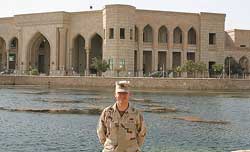
Capt. Adam Siple, BA ’99, a member
of the Judge Advocate General’s
Corps., stands outside his office in
the Al-Faw Palace—a former palace
of Saddam Hussein’s—near
Baghdad International Airport. He is
halfway through a one-year deployment
with the 18th Airborne Corps.
|
For his first four months in Baghdad, Siple
oversaw legal services for soldiers and provided
technical support and oversight to all U.S.
foreign claims operations in Iraq. As head
of a three-member foreign claims commission,
he traveled to the convention center in downtown
Baghdad on a number of occasions for full days
of face-to-face meetings with Iraqis seeking
compensation from the U.S. government for property
damage and accidental injury. “We made
a point of taking the time to sit down with them,
listen to their stories, and, at times, hear
them cry,” Siple says. “Unlike
Americans, who tend to be very short and to the
point, Iraqis want to connect with you on a personal
level. They are extremely respectful and deferential,
and spending time with them provided me with
unique insight into how their lives are going.”
Siple’s weekend journeys to the convention
center were often made by Black Hawk helicopter
to avoid the threat of suicide bombers on the
infamous airport road. “Too many spectacular
attacks have been staged on the airport road,” says
Siple, stating that some days, he hears the explosions
from his office. The helicopter rides were a
highlight for Siple. “It gave me a great
perspective of the city, as we flew over the
marketplaces, homes, and children playing soccer
in the fields,” he says. “It helps
you to see that there are a lot of ordinary people
out there, who I feel will eventually prevail.”
Since May, Siple has served as a military prosecutor,
as well as primary legal adviser to two brigades. “I
talk to commanders on a daily basis about military
justice issues, rules of engagement, administrative
and regulatory issues, and investigations,” he
states. His life at the moment is, more or less,
confined to his base—Camp Victory—where
he both works and lives. Home is a partitioned
trailer shared with five other soldiers. He eats
all of his meals in the base cafeteria, which
he says is “pretty good, but gets old after
awhile.” There are tastes of home on the
base—Subway, Burger King, Cinnabon, a coffee
shop, and a gym. Siple and the 20 lawyers who
work with him have formed a close, supportive
group. “We had a barbecue on the Fourth
of July, watch movies and have meals together,
joke around a lot, and just try to keep an eye
out for each other,” he says.
Although Siple works long hours with almost
no days off, he says the experience is worthwhile. “From
a very young age, I’ve always wanted to
give something back to our country, because I
feel blessed to live in the United States,” he
says. “I’m happy to give a year of
my life over here in the hope that at the end
of the day we’ll succeed in getting Iraq
up and running again, bring in stability, and
help them move incrementally toward a better
life and society.”
A European Perspective
“One year in Iraq teaches you a few things,” says
Sgt. Istvan L. Gabor, BA ’01, who served
in Operation Iraqi Freedom from March 2003 through
March 2004 with the 41st Transportation Company.
An Elliott School of International Affairs alumnus,
Gabor enlisted in the Army eager to change the
world, experience real life, and “pay back” the
United States for taking his family in.
“My
family is Hungarian, but we lived in Romania
as a minority under the Communist dictatorship
of Nicolae Ceausescu,” he explains. “Those
times were not the best, especially for minorities.
My parents fled to Germany to escape the regime
and were later granted asylum in the United States,
where my siblings and I had the opportunity to
attend schools of higher education and lead successful
lives. As the youngest of four children, I felt
it was my duty to serve the United States in
the name of the entire family.”
In Iraq, Gabor says that his duties were simple: “stay
alive and keep my fellow soldiers alive.” His
unit transported ammunition and supplies to
camps all over Iraq and Kuwait, and was, therefore,
constantly on the move. “The vehicles
that we drove were 120 to 150 degrees Fahrenheit
inside, and there was no air conditioning anywhere
that we went. Communication with our families
was scarce at best. Still, seeing the good
that we were doing inspired us to go on with
the mission.”
Gabor viewed the historic events in Iraq with
an eye of experience. “It was interesting
for me to see the fall of the regime from
the outside as a foreigner and not a national,
as was the case during the revolution of 1989
in Romania. I could not help but see the parallels
between the two.”
In analyzing the events, Gabor says he particularly
enjoyed putting his Elliott School education
to practical use. “It was a privilege to
be on the ground seeing the democratic process
firsthand and viewing the hardships of new
government with my own eyes, rather than reading
interpretations offered by someone else.”
Building Schools and
Cultural Bridges
Hopscotch and “Duck, Duck, Goose” are
hardly prerequisite skills for U.S. soldiers,
but they came in handy for 1st Lt. Chris Kucharski,
BA, ’02, and his platoon. A member of the
101st Airborne Division, Kucharski was an infantry
platoon leader in Mosul from September 2003 to
February 2004.
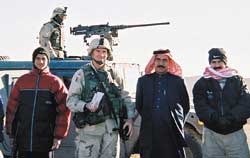
First Lt. Chris Kucharski, BA ’02,
who served as an infantry platoon leader
in Mosul from Sept. 2003 to Feb. 2004,
was heading back to Iraq at press time
for a second tour of duty.
|

|
While most of his time was taken up “making
sure all 40 of my guys came home safe and alive,” one
of his most memorable moments was playing with
local kids while staffing the opening ceremony
for a new school in the village of Abu Fischke,
a suburb of Mosul.
“We donated $30,000 from our brigade to
build a new school in the 500-person village,
where children attended class in an ancient mud
and straw building with no desks,” he explains. “We
built them a two-story school with nice, large
classrooms and furniture. The whole village came
to the grand opening, where the kids were fascinated
by us and our gear. A bunch of soldiers taught
them how to play Duck, Duck, Goose and gave them
Skittles, which they had never seen. To thank
us for the school, the townspeople painted a
mural of a school with an eagle—our division’s
symbol.”
Throughout his time in Iraq, Kucharski did
his best to help bridge the vast cultural divide
that exists between Iraqis and Americans. “They’ve
been fed information their entire lives through
the Baath Party and Saddam Hussein that all
Americans are huge and evil,” he says. “Through
contact, we broke down some cultural barriers
and showed them that we’re just regular
people.”
Kucharski says that he’s frustrated by
the media’s one-sided coverage of the
war. “It’s
just ridiculous that they’re not showing
all the construction that we’re doing
over there—the roads, bridges, and schools,” he
states. “We’re doing so much more
than just being shot at and killed.”
At press time, Kucharski was heading back to
Iraq to serve for another year. “It’s
a taste of insanity, if you’ve never
had it, over there, but it’s rewarding.”
An Election Day to Remember
While studying for his Master of Public Administration
degree at GW, Lee Swietlikowski, MPA ’02,
never dreamed that he’d soon have a front-row
seat to the birth of a democracy. Deployed
to Iraq for 13 months beginning in January
2004 with his unit, the 2nd Brigade Combat
Team of the 25th Infantry Division, the fire
team leader was captivated by the events of
Election Day in the Northern Iraqi city of
Kirkuk, where he was based.

|
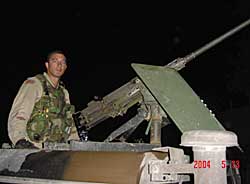
Infantry Fire Team Leader Lee Swietlikowski, MPA ’02, who served
in Iraq for 13 months, stands in an up-armor Humvee before going on a
raid in May 2004. He is now back at his home base in Hawaii, training
for another tour in Iraq next year.
|
“We were anticipating large-scale, coordinated
attacks throughout the day,” he reflects. “The
morning began with firefights, improvised explosive
devices, and numerous other intimidation tactics
at locations throughout the city. They continued
en masse up to approximately 8:30 a.m. At that
point, it was as if someone flipped a light switch
and the large-scale violence ceased. With polls
opening, the insurgency tacitly conceded that
there was little more they could do to dissuade
the voters from turning out at polling sites.
The people turned out in record numbers and celebrated
in the streets. The city of Kirkuk celebrated
Election Day like a national holiday. The sectors
of the city where we were usually harassed and
heckled came out to shake our hands and thank
us. For a student of government, it was a truly
unique experience.”
Due to return to Iraq for another tour in the
middle of 2006, Swietlikowski reflected from
his home base in Hawaii that he’s happy
to answer the call. “When Pearl Harbor
was attacked, the nation answered,” he
says, “and that’s why I signed
on to serve our country after the attacks of
Sept. 11th. The ‘greatest generation’ collectively
dropped what they were doing to serve a cause
higher than their own self-interest, and I
feel that we need to respond in kind.”
A New Perspective
It’s a long way from finance class at GW
to the heat of the battle for 2nd Lt. Daniel
Wise, BA ’05.
Wise entered GW as a business major in fall
2000, after signing up for Army ROTC and the
Reserve. As tensions continued building after
the Sept. 11, 2001, attacks, he began preparing
himself for the inevitable call to active duty.
It came in January 2003, when his reserve unit
was activated, and culminated in six months of
service in Iraq beginning in March 2003. “I was there for
the invasion and the initial major combat operations,” says
Wise, whose 21st birthday coincided with the
launch of Operation Iraqi Freedom.
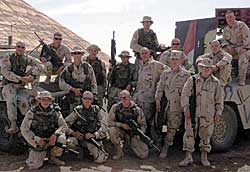
Second Lt. Daniel Wise, BA ’05,
(top row, second from left) and his Psychological
Operations detachment, known as the “Wild
Deuces,” pose at a captured Iraqi
military installation in Al Kut on April
21, 2003, just after liberating the town.
|

|
A member of the psychological operations team,
Wise entered Iraqi towns before the troops, attempting
via loudspeaker to get militants to surrender
and families to leave before the fighting began. “The
first major mission I was involved in was the
pacification of Nasariyah, which, before Fallujah,
was the most dangerous city in Iraq,” he
says. “When we got there, they were blowing
the place up. It was pretty crazy, but we did
what we had to do. Then, along with the 24th
Marine Expeditionary Unit, we liberated all the
towns between Nasariyah and Al Kut, 90 miles
to the north.”
Resuming his studies at GW in January 2004,
he experienced reverse culture shock. “Your
view of the world is so much larger after you’ve
gone to war,” he explains. “Sitting
in my voice and diction class listening to my
classmates give speeches on life experiences
like playing field hockey in high school and
scooping ice cream in the summer frustrated me,
to say the least.”
Shortly after his GW graduation this past May,
Wise was commissioned as an Army second lieutenant.
He is now in Fort Benning, Ga., for five months
of officer training and will then lead a platoon
of 33 infantry soldiers. “Given current
troop levels, I anticipate returning to Iraq
with my platoon within the next 12 months,” he
says.
Wise says he is ready for the challenge and
eager to serve his country. “One thing
I took away with me from Iraq is an appreciation
for how great Americans have it compared to many
places,” he says. “We’re very
fortunate people.”
The First to Go

|
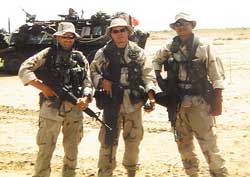
Jeffrey Reider, BA ’05 (left), served in Iraq for six months during
the first wave of Operation Iraqi Freedom. An infantry platoon sergeant
with a light armored reconnaissance company, he was called up to serve
midway through his junior year at GW and later returned home to graduate.
|
When Jeffrey Reider, BA ’05, enrolled at
GW to study political science, he thought that
his days of active military service were behind
him. After six years in the Marine Corps, he’d
decided to pursue a civilian life. Midway through
his junior year, Reider’s reserve unit
was called up to serve in Iraq.
“We went in as part of the first wave of
Operation Iraqi Freedom in March 2003 and stayed
for six months,” says Reider, an infantry
platoon sergeant with a light armored reconnaissance
company. “Fortunately, GW made it very easy
for me to take a leave of absence and even gave
me a full refund of the tuition that I’d
paid for the semester.”
Once in Iraq, his unit worked 18 hour days
providing convoy security for Army units in the
Sunni Triangle. “When
we first got there, we were seen as liberators,” he
says. “As we went through towns, the entire
population would come out with big signs saying ‘Thank
you, America.’ It felt good that they wanted
our help getting rid of Saddam Hussein and we
were giving it
to them.”
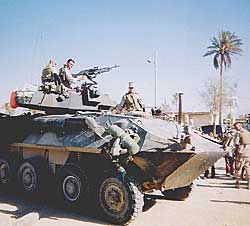
Jeffrey Reider, BA ’05, patrols
the streets of Iraq.
|

|
After the heavy fighting subsided, Reider’s
unit expanded their focus to include humanitarian
work. They rebuilt schools, founded and trained
the police department on the Iran/Iraq border,
and provided medical care to entire towns. “It’s
sad how the media portrays things,” says
Reider. “You never see the reconstruction
and humanitarian side of things reported on television.
You only see the daily death toll. It makes it
seem like these young soldiers are dying in vain,
when they are really doing great work over there.”
Returning home in October 2003, Reider transitioned
seamlessly back to GW, graduated in January 2005,
and landed a civilian job with Virginia-based
A-T Solutions Inc., which provides anti-terrorism
training and consulting services. Of the experience,
he notes, “The University was extremely
supportive, even giving me preferential registration
when I returned to make sure that I could get
back on track as quickly as possible.”
Heart of the Action

|
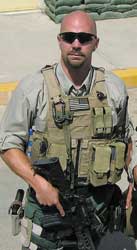
Diplomatic Security Service Special Agent H. Albert Wittliff, BA ’96,
signed on to help protect U.S.
diplomats in Iraq. He’s currently serving a one-year tour as a
regional security officer based in Kirkuk.
|
H. Albert Wittliff, BA ’96, knows what
it means to be in the heart of the action. On
Sept. 11, 2001, he was working as a strategist
for the Pentagon’s Joint Chiefs of Staff
War Games Division when the plane struck. “I
stayed and helped rescue people for around six
hours,” he says. “It was then that
I decided I needed to get closer to the front
line.”
Probing his options, Wittliff considered the
U.S. Department of State’s Diplomatic Security
Service.” He explains: “I’ve
always wanted to be a special agent, and after
9/11, I felt that I could help protect Americans
the most if I was posted overseas, where we have
the chance to intercept terrorists before they
get to our homes. DSS provided that opportunity.”
Soon after landing a job with the DSS, he volunteered
for a one-year tour in Iraq. “I signed
on to help protect our diplomats there,” he
says. This past February, he began his stint
as a regional security officer, based in the
U.S. regional embassy in Kirkuk. “We coordinate
security for the northeastern quadrant of the
country—everywhere from Saddam’s
hometown of Tikrit to Kurdistan,” he says.
In addition to helping create a secure physical
environment for diplomats, Wittliff coordinates
with military and intelligence officers on security
threats, conducts counterintelligence and criminal
investigations in the area, and organizes armored
motorcades to transport embassy staff safely
to meetings throughout the region.
To prepare for his position, Wittliff completed
seven months of basic agent training, followed
by a domestic assignment in Washington and a
regional security officer’s course. He
also completed a seven-week high threat protection
training course, mastering feats like running
with 50 pounds of armor and rigorous driving
maneuvers. He is skilled in a wide variety of
weapon systems—from five-shot revolvers
to 50-caliber machine guns and everything in
between. Wittliff is quick to state, however,
that he does everything he can to avoid gunfire. “The
goal of our job is to avoid danger,” he
says.
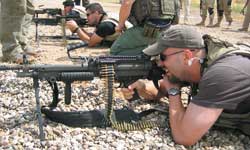
Diplomatic Security Service Special
Agent H. Albert Wittliff, BA ’96,
(right) takes aim at target practice.
|

|
One of the most memorable moments for Wittliff
was working collaboratively with Iraqi security
forces to solve a recent incident involving a
local politician whose vehicle was shot at. “He
claimed that an American protection detail had
done the shooting, so I was asked to investigate.
We initiated a joint investigation and concluded
that shots had been fired from behind the vehicle,
not in front of it, where the American motorcade
had been,” Wittliff says. “By working
side-by-side with an Iraqi security detail, we
began to see each other more as partners in trying
to keep people safe in this country. We made
some real breakthroughs as far as building rapport
and working together in a positive way. The trust
level is growing, and that’s a huge success.”
The most difficult part of his service in Iraq
is being away from his infant son, Travis, who
was born in November. “Missing him is the
worst part, hands down,” he says. “There
are days that are so bad that I don’t know
how I’m going to get through them without
getting on a plane and going home.”
But Wittliff always stays, because he believes
in his mission. “I’m proud to be
here protecting diplomats from danger so that
they can do good work.”
Keeping the
Home Fires Burning

|

Cassie (BA ’94) and Doug O’Brien on the deck of their Laguna
Beach, Calif., home last August, the night before Doug departed for reserve
duty. He is serving in southern Baghdad with the Army National Guard.
|
Cassie (Fleig) L. O’Brien, BA ’94,
has never been anywhere near Iraq, but
the faraway land nevertheless dominates
her thoughts. Her husband of five years,
Doug, has been serving in southern Baghdad
with the Army National Guard since February
and will likely remain there until December
or January. When we e-mailed the GW community
searching for servicemen and women to
interview for this article, O’Brien
immediately fired back a reply, rightfully
pointing out that family members of those
serving should also be recognized in
the story. “Staying home and worrying,
sending packages, and taking over all
the commitments at home is a lot of work,
as well, and emotionally draining at
times,” she stated.
It’s been a long year for O’Brien
since Doug departed for reserve duty
last August. “He felt that it was
his obligation to serve his country at
this time since he’d had Special
Forces training,” she says. “I’m
really proud of him for acting on something
that he feels so strongly about, but
it’s not easy. We e-mail each other
every day, and if I don’t hear
from him for a few days, I panic. You’re
always on guard and have to mentally
prepare yourself for the worst. That’s
the hardest part.”
Still, e-mail
is a blessing, she says. “It
really helps us to feel connected and
less lonely. During our daily conversations,
we talk a lot about everyday life, which
makes Doug feel closer to home and helps
take his mind off of things in Iraq.” She
also sends him frequent packages containing
tastes of home, like magazines, books,
and candy. She even sent him his bike,
so that he could cycle around the base. “He’s
a big cyclist here in the states and
really missed it,” she says.
O’Brien stays busy round the clock,
studying days for her doctorate in psychology
at Argosy University in Costa Mesa, Calif.,
and working nights in a restaurant. “I’m
thankful that I’m so busy and that
I have a lot of support from friends
and family.”
In April, Doug came home from Iraq
for two weeks leave. “It was amazing,
but, at the same time, he felt a little
guilty being home while his unit was
back in Iraq capturing terrorists,” she
says. “It takes awhile to get out
of the mindset of war. Still, I wouldn’t
have traded our time together for anything.” |
|